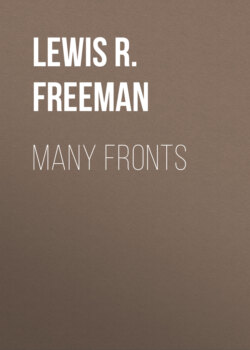Читать книгу Many Fronts - Lewis R. Freeman - Страница 4
На сайте Литреса книга снята с продажи.
I
ОглавлениеTable of Contents
I had known F—— through years of hunting and sports in India, but never until the night that our old British-India coaster lay off the Shat-el-Arab bar waiting for the turn of the tide to run up to Bassorah, did I hear him speak of the things that were really next his heart. Then it was that I was vouchsafed transient vision of the outer strands of the previsionary web England was weaving beyond the marches of India against events to come. I will give his story, as nearly as I can remember, in his own words.
For the best part of the last five years [said he], I have been coming to Arabia and Mesopotamia on “language study.” In all of that time I have not been back to England, and I am almost a stranger to the officers of my own regiment. I talk like an Arab, I am beginning to think like an Arab, and, what with sunlight and dirt that have gone so deep under my epidermis that they will never come out, I shall soon look like an Arab. Perhaps in time—you’d never believe the appeal of the Koran till you’ve bowed toward Mecca, with a Bedouin on either side of you, morning and evening, for six months at a stretch—I shall pray like an Arab. I have had smallpox, dysentery,—which has become practically chronic,—and a dozen varieties of fevers and skin diseases, and I’m mottled from head to foot with “Aleppo button” scars, two of which have never healed. I’ve been alone so much that I talk to myself even in Calcutta and Simla. The Persians in this region distrust me, the Russians and Germans hate me, and the Turks are perfectly frank in saying that they will send me on “the long pilgrimage” if ever a fair chance offers.
All that my Government does is to allow my pay to go on and to provide me with a passport that will land me at Koweit, Bassorah, or Bagdad. If I get into trouble they will not—cannot, in fact—do as much for me as they would for a spindle-legged Hindu coolie. And all this on the chance that, some time before I am retired for old age or invalided from the Indian army, the Great White Bear will try to come down to the Persian Gulf to slake his age-long thirst. In this contingency, of course, there is no denying the fact that I shall be very much in demand, especially if operations are carried on in my own “sphere,” that of North-Eastern Arabia and Southern Mesopotamia, up to a line drawn from Bagdad to Hitt.
Afoot, or by horse or camel, I have traversed almost every square mile of this region. There is not a bazaar from Kerbela to Koweit in which, disguised, I cannot mingle unsuspected in the throng, or, in case of need, call upon friends who will do anything, from giving me a cigarette or a handful of dates to risking their lives to save my own. I also know every one of the greater, as well as most of the lesser, Bedouin sheikhs whose peoples roam the deserts between Bassorah and Damascus; and with one of the most powerful of these—his camels are over 100,000 in number and his sheep and goats three times that—I have gone through the “blood brotherhood” ceremony. The blood of our arms has actually mingled, and each is pledged to stop at no act to serve the other. My friends, I need hardly say, are all Arabs, Chaldeans, Syrians, Jews, or people of one of the other subject races of this region; to the Turk, courteous as he is to me socially in Bagdad and Bassorah, my name is anathema. A week hence, for instance, I shall exchange Oriental amenities with the Vali of Bagdad in his garden on the banks of the Tigris. He will toast me in scented coffee and drink to the success of my visit; and all the while a double guard of police will be watching the gates to prevent my getting away to the desert and my Arab friends. Personally, I know it would pain him if I were to be shot in the dark for neglecting to answer a sentry’s challenge; but officially he is dead keen for it, and there is no doubt that it would do him a lot of good in Stamboul, where he is not in very high favour at present.
The whole thing, when all is said and done, resolves itself down to about this: If a war involving operations in this “sphere” comes within the next twenty years, I,—and a couple of other chaps who are doing the same sort of work,—provided I do not lose my life, or my health, or the best of my faculties in the interim, will probably break all records outside of a Central American revolution for quick promotion. I should probably be a brigadier-general at forty, with ten or a dozen letters after my name. But if, as is likely, there is no war, I shall probably continue these little jaunts into the desert until my health gives out, when, at best, I shall be invalided home and retired on the half-pay of a captain or a major.
So, you see, my future depends entirely upon whether or not some of our neighbours, or would-be neighbours, see fit to “start something” in this little neck of Central Asia within the next decade or two. And now that Russia is in the Entente, and we are acting so entirely in concert with her in Persia, I’m very much afraid that it’s going to be a case of the “hope deferred which maketh the heart sick.”
